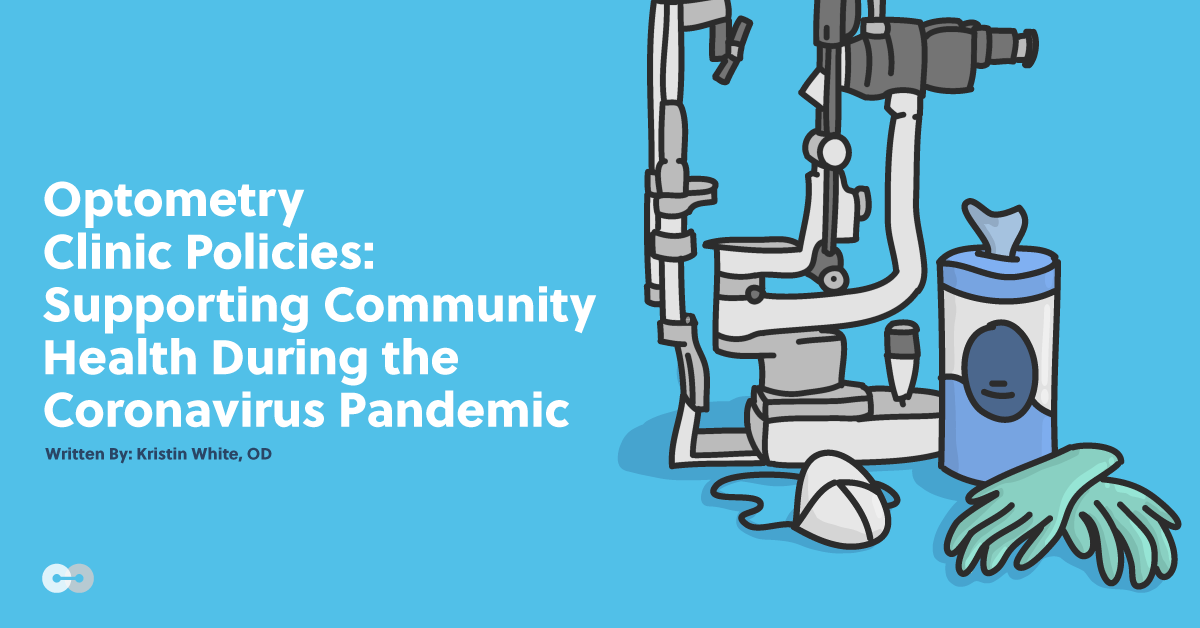In light of the current coronavirus pandemic, it may be a good time to update and enforce your optometry practice’s policies on supporting the overall health of the community. All offices should have systems in place for sick leave, sterilization and recommendations for patients and office staff during the winter season and especially with the current threat of coronavirus.
Sick Leave
As a leader in your office, your staff should first and foremost know what their
sick leave policies are.
- Do they receive paid sick leave and how much?
- Do they receive PTO that combines sick leave and vacation time?
- What is your policy for unpaid sick leave?
During a normal cold and flu season, your staff or their family members may become ill. Staff should know that you prefer them to stay home if they are sick and could be contagious.
Additionally, if their children are sick and they cannot go to school, be supportive of your staff taking time off to care for them.
While we all know our staff is crucial to a clinic day running smoothly, keep in mind that if your staff member comes in to work while sick, they will be less productive and will likely infect other staff members and patients as well. With multiple staff members sick, your office will be hurting much more than if the first person who was sick stayed home in the first place. Staff must know that it is ok to use sick time and that it is even preferred, lest they feel uncomfortable doing so.
Have a policy in place for who they notify and by what means as well as contacting back-up staff to cover for them if that’s an option.
Disinfecting
At all times throughout the year, equipment and surfaces in your optometry practice should be maintained clean and disinfected. However, during cold and flu season, and now through the coronavirus pandemic, your staff must be ever more diligent.
Keep your office liberally stocked year-round with gloves, masks and cavi-wipes or other medical grade disinfectant wipes that kill a variety of bacteria, viruses and fungi. Ensure you have a policy regarding sterilization of equipment. Maybe year-round this occurs at the end of the day with a stronger sterilization method, but when there are more infections available this should be occurring between each patient.
Of course surfaces that touch a patient’s face should be cleaned at least with alcohol between each patient—this includes not only the auto-refractor, NCT, fundus camera, OCT, slit lamp and tonometer probe, but also the pupillometer in your optical.
When enforcing sterilization procedures, don’t forget to include door handles, desks, countertops, faucets and phones.
Handwashing
Handwashing is essential for diminishing the spread of germs. As we’ve all been learning, the majority of us haven’t been washing our hands properly.
Lather for a full 20 seconds ensuring to scrub all parts of your hands and fingers (including nails) and then rinse for 10 seconds.
Staff should be required to keep nails shorter than ¼ inch for cleanliness. All staff should wash hands before and after each patient interaction. Recommend contact lens wearers wear their glasses more often to protect their eyes.
Additionally, everyone should avoid touching their face, nose and mouth. If you must adjust your glasses, do so with a tissue instead of your hands.
Personal Protective Equipment (PPE)
Your staff should be wearing masks, especially if they feel even a slight runny nose or sore throat, with the consideration of wearing them year round (whether or not they receive a flu shot).
Have a sign on the front door to your office that if a patient feels unwell, that they kindly also put a mask on immediately—and have these readily available at the entrance to your office. Wear gloves if someone has a red eye of any type respiratory illness.
Cancel non-urgent visits
Especially right now, when social distancing is recommended across countries, strongly consider the AOA and CDC’s
recommendation for only seeing urgent eye visits to limit patient interaction.
By keeping your office open to
urgent cases, you are freeing up much needed space in already overburdened emergency rooms. Let urgent care and emergency rooms know that your office is available to these urgent ocular cases.
People are scared right now, and may think any slight eye problem could be an indication that they have COVID-19. As their eyecare provider, you can reassure them and give them accurate information. Rest assured that while COVID-19 can cause viral conjunctivitis, this only occurs in about
1-3% of cases, so not every red eye in your office right now is coronavirus.
Ask patients to limit the number of people they present to the appointment with. Have other family members wait in the car, unless they are the patient’s caregiver.
Triage patients who are on your schedule for their reason for visit. Reschedule glaucoma, cataract and other non-urgent follow-ups for at least mid-April. Consider extending patient’s contact lens prescriptions for another 3-6 months and offering patients to purchase 6 month’s worth of contacts to hold them over until they can be seen next.
Use this time to establish a telemedicine protocol, whether that be by phone or video conferencing for select problem visits.
In conclusion
Above all else, have policies in place and be the example of how you want your team to behave. If you’re ill, don’t try to be a hero and come to work. Clean your space, wear a mask, encourage staff to disinfect frequently and cancel all non-urgent eye appointments.
Let your patients know you are available for urgent ocular problems, will help them
order sufficient contact lenses and look forward to seeing them once life returns to normal.
CovalentCareers is committed to supporting optometrists and optometry students during the Coronavirus pandemic. For more optometry-specific resources and information, visit our Optometry COVID-19 Resource Center.
